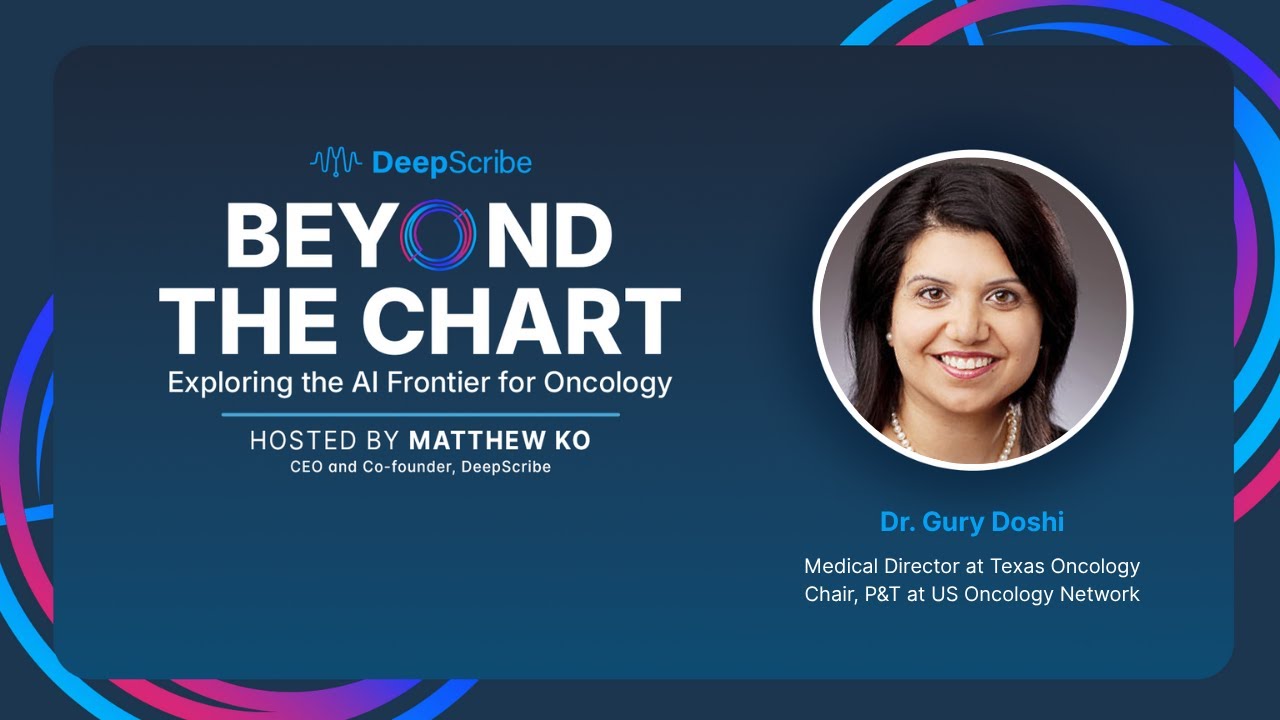Community Oncology and the Evolving Future of Cancer Care: Conversation with Gury Doshi, MD, Texas Oncology
Dr. Doshi discusses the value of AI in today's exam room, and her vision for AI accelerating clinical trials and drug development, and enabling more personalized care.


Did you know that more than 70% of cancer care visits are delivered in community oncology centers? Community oncologists take on a substantial responsibility for quality care, yet are faced with the pressures of administrative work and the constant evolution of cancer treatments. The added work pulls them away from the people who depend on them most – their patients.
Every cancer patient expects a level of comfort and connection as part of their journey, an expectation that’s only amplified within the personal environs of a community setting. How can the community oncology model be protected and strengthened to deliver on those expectations while delivering the highest quality care?
In the premiere episode of Beyond the Chart: Exploring the AI Frontier for Oncology, DeepScribe founder and CEO Matthew Ko explores these questions and more with Dr. Gury Doshi, Medical Director at Texas Oncology and Chair of the Pharmacy & Therapeutics Committee at The US Oncology Network.
A Mission Rooted in Access and Innovation
Community oncology is more than just a setting. It’s a philosophy of care built on patient access, trust, and connection. Dr. Doshi explains that Texas Oncology’s founding belief was simple but radical: every patient deserves high-quality cancer care close to home.
That mission continues to guide the organization’s 300+ sites across Texas. From rural regions to urban centers, Texas Oncology ensures patients can receive cutting-edge treatment without the emotional and financial strain of long-distance travel.
But maintaining that mission requires constant innovation. Dr. Doshi emphasizes that preserving the community model means more than keeping doors open — it means ensuring clinicians have the tools, policies, and technologies that empower them to practice medicine at the top of their training.
Administrative Demands and Physician Burnout
The modern oncologist faces a paradox: the promise of technology to streamline care, but the reality of systems that often do the opposite. Dr. Doshi points out that electronic health records (EHRs) , originally intended to make care coordination easier, have instead become one of the leading causes of physician burnout.
“The electronic health record has been something that has increasingly consumed more time and posed an administrative burden; it's now the number one cause of physician burnout.”
The challenge is especially acute in community oncology, where clinicians balance growing patient volumes with increasingly less time to nurture a meaningful connection. Every hour spent clicking through EHR menus and documenting care is an hour not spent with patients face to face. As such, addressing burnout isn’t only a wellness issue; it’s a patient care imperative. Streamlined documentation and workflow support are key to preserving empathy and presence in the exam room.
Ambient AI and the Return to Presence
When Texas Oncology implemented DeepScribe’s ambient AI solution, the results were immediate and tangible. Dr. Doshi reports that physicians are saving an average of 3.5 hours per week. That’s time they’re now spending with family or focusing more deeply on patients rather than documentation.
“My patients really said, ‘It’s so nice, Dr. Doshi, that you’re not sitting by the computer. You’re actually sitting right in front of me.’”
The savings in time and cognitive load contribute to what Texas Oncology calls its “home in time for dinner” initiative, a movement for clinicians to reclaim time, reduce stress, and re-center medicine on the human connection. Not only is all of this healthy for the provider, it’s also great for retention, with physicians feeling respected both professionally and personally.
Beyond Documentation: The Future of Clinical Intelligence
The potential of AI in oncology extends far beyond structured note-taking. As Dr. Doshi and Matt Ko discuss, every patient conversation holds untapped insights: patterns in symptoms, language, or care decisions that could inform personalized treatments or improve clinical trial design.
“I like to really frame this up as clinical intelligence — using the technology, harnessing all of the data together to accelerate drug development and therapeutic solutions for cancer patients.”
By organizing and analyzing data that once lived only in physician memory or free-text notes, AI can reveal new opportunities for more individualized care, and even better access to care. It’s not about replacing intuition, but enriching it with intelligence drawn from thousands of patient encounters.
Documentation of each patient visit becomes the foundation for discovery: a living dataset that can be tapped into to predict needs and design the next generation of oncology innovation.
Technology Adoption at Scale
Technology has the power to transform only as far as its adoption. Dr. Doshi emphasizes that successful implementation demands alignment between clinical and technical teams, a vision that Texas Oncology and DeepScribe share in their partnership.
“You can’t drive adoption through brute force. You have to drive adoption because you are best in class.”
Rather than forcing change through top-down mandates, Texas Oncology leaders nurtured feedback loops, encouraged physician input, and embedded AI into daily workflows. With this approach, ambiebnt AI wasn't just adopte - it was embraced.
The lesson for other healthcare systems is clear: scale begins with trust, and trust begins with listening to the users and contributing teams.
The Future, One Conversation at a Time
The future of oncology will be built not in boardrooms or data centers, but in the patient rooms where every conversation matters.
By blending the compassion of local care with the capabilities of intelligent technology, leaders like Dr. Doshi and partners like DeepScribe are redefining what’s possible — for clinicians, for patients, and the communities in which they liv and work.
Watch the full episode to hear how this future is already unfolding at Texas Oncology, one patient and one conversation at a time.
text
Related Stories
Realize the full potential of Healthcare AI with DeepScribe
Explore how DeepScribe’s customizable ambient AI platform can help you save time, improve patient care, and maximize revenue.




